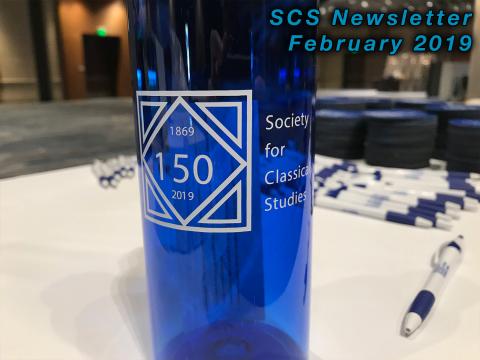This time last year, we were able to provide a full annual report for 2017 in the SCS newsletter. This year has proved more challenging in the aftermath of the San Diego meeting. We present in this newsletter a short report from the Executive Director as well as reports from the Vice Presidents of our five programmatic divisions. The other elements of our 2018 annual report will follow later in the year.
Before addressing 2018, I would like to provide an update on how we are continuing to address diversity, inclusion, race, and racism and also the hierarchies in the field that make open discourse difficult. Please see the Presidential Letter, correction to the Presidential Letter, and the statement on anonymous attacks and reactions to that for the context. I have previously noted that we plan to have an ombuds at our annual meeting in 2020, will work with AIA on joint policies and procedures on harassment and respectful behavior, and are planning workshops and special events addressing different aspects of diversity and inclusion. We are also now working with a consultant to give us an outside and expert perspective on some of the serious issues that we are facing. Following on the Future of Classics panel, we also plan to start once again collecting aggregate demographic data on authors of submitted, accepted, and rejected journal articles in Classics in North America. This is something that SCS has not done since 2008.
I turn now to 2018. This was a busy year across our programs, and I summarize here some highlights that are discussed in more detail by the Vice Presidents in their individual reports. I focus here on some things that happened in 2018 that did not get a lot of publicity, but have made and will continue to make a positive impact. We made some changes to criteria of two of our awards, which may seem minor but which have really made a difference. The Education Division worked hard this summer and Fall to simplify the nomination and application instructions for our Precollegiate Teaching Award and increase the value of the award with financial support for award winners to attend either the ACL Institute or SCS Annual Meeting. As as result of these efforts, we received a fantastic group of nominations and applications. Both award winners attended the Annual Meeting in San Diego. For our Minority Scholarships, we changed one element of the application criteria, as recommended by the Committee on Diversity in the Profession. Students no longer have to have a letter of recommendation from a SCS or AIA member. This has opened up the scholarships to many students at institutions that do not have Classics faculty who are members.
For the first time at our Annual Meeting, we featured "lightning talks", a recommendation of the Program Committee way back in summer 2017. The lightning talks flip the usual model of longer talk followed by short discussion period, with short talks of six minutes each followed by fourteen minutes of audience discussion. We hope to see more submissions in this category for 2020. We were also delighted to work with Classics and Social Justice and the Onassis Foundation to bring playwright Luis Alfaro the the meeting for a public lecture, and with two recently-chartered affiliated groups, Eos (chartered in 2017) and the Mountaintop Coalition (chartered in 2018) on their events.
In our Publications and Research division, we signed a publication agreement with University of Oklahoma for the Digital Latin Library, whose Library of Digital Latin Texts is now accepting proposals for new open access editions of Latin texts. We also started making preparations for a special issue of TAPA, which will be published later in 2019 by Johns Hopkins on the occasion of the Society's 150th Anniversary, along with a timeline of the journal's history. SCS office staff, students assistants and interns also worked to understand the history of the Society's book publication program, the results of which you can view here.
Our Professional Matters division worked very hard in 2018 on the following revisions of policies and statements: a revision of the Placement Guidelines, which now include guidelines on remote interviews; a revision of our annual meeting harassment statement and our grievance procedures in the Regulations; and ongoing work on our Professional Ethics statement, more revisions to which will appear on this summer's ballot. SCS also issued the first ever survey on harassment and discrimination in the field. Although there was vigorous debate about the wording of this survey, it is a major achievement to have completed this. A report is forthcoming in April of this year. In addition, we welcomed AIA back into the Placement Service.
In the Communications and Outreach division, our blog and social media presence continued to thrive. We also launched in Fall 2018 the Classics Everywhere initiative that is providing funds for public outreach initiatives in 2019 and hired Nina Papathanasopoulou as a part-time public engagement coordinator.
More February 2019 Newsletter Content
Read the Education and Communication & Outreach Reports
Read the Program and Publications & Research Report
Read the Professional Matters Report
Photo Credits for February 2019 Newsletter
by Lemsipmatt
licensed under CC BY-SA 2.0
- “Sneakers"
by nathanmac87
licensed under CC BY-SA 2.0
- "Reproduction of the 'Ladies in Blue' Fresco"
by Emile Gilliéron
The remaining photos were taken by Erik Shell at the 2019 SCS Annual Meeting and are unpublished.
Image

